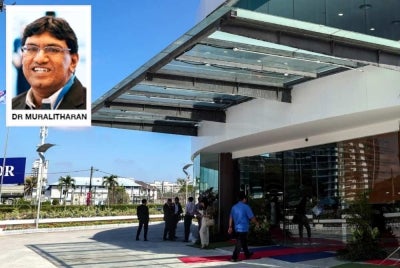Addressing obesity demands a multi-disciplinary approach, here's why

OBESITY is an issue that must be addressed, as it contributes to the rising burden of non-communicable diseases (NCDs) that strain a country's economy.
Malaysia faces a growing challenge in addressing obesity and its related complications, ranging from diabetes to cardiovascular diseases, and even its implications on mental health.
According to experts, addressing this issue requires a comprehensive approach, better healthcare interventions, and a focus on advocacy at every level of society.
Deputy Director of Non-Communicable Diseases of the Health Ministry Dr Noraryana stressed the urgency of the situation and called for a comprehensive team to spread awareness on obesity complications.
"The burden of NCDs amounts to around RM64.2 billion, with indirect costs outweighing direct medical expenses. This is due to absenteeism, presenteeism, and the psychological toll of obesity.
"We need a comprehensive team to make people aware of the complications of obesity. A whole-of-society approach involving NGOs, private sectors, and policymakers is crucial," she said in a World Obesity Day forum recently.
GAPS IN MALAYSIA'S HEALTHCARE SYSTEM
President of the Malaysian Obesity Society (MYOS) and Senior Consultant Endocrinologist Prof Dr Rohana Abdul Ghani said Malaysia’s healthcare system is currently ill-equipped to handle the obesity epidemic comprehensively.
She noted that many healthcare providers are hesitant to initiate conversations about weight management with their patients.
"Less than half of our healthcare providers bring up the subject of obesity. When a patient comes in for knee pain or breathing difficulties, we need to ask, 'Would you like to talk about your weight?' This needs to be normalised,” she emphasised.
Another critical gap is the lack of specialised weight management services.
"Multi-disciplinary approaches are key. However, most hospitals lack the resources to offer services like dietitians, physiotherapists, and clinical psychologists under one roof," she said.
Dr Noraryana echoed this sentiment, emphasising the importance of early detection and structured interventions.
"We need to improve our programs, starting with schools, and focus on primary and secondary prevention. While 851 localities across the country are conducting screenings, interventions remain patchy and need formalisation," she added.
According to Dr Noraryana, healthcare systems must play a proactive role in tackling obesity at the community level. Advocacy and intervention should begin with primary prevention, such as promoting healthy lifestyles, balanced diets, and regular physical activity.
“We must continue programs like the ‘quarter-quarter-half’ plate concept and the 10,000 steps campaign. Additionally, we're working to enhance community projects and screening programs to raise awareness and encourage early detection," she said.
Meanwhile, Dr Rohana suggested innovative strategies like incorporating Body Mass Index (BMI) as the 'sixth vital sign' to ensure weight management is prioritised during medical consultations. She also called for addressing misconceptions and misinformation about weight loss.
"My own mother once told me, ‘Rice does not make you fat.’ Imagine the misinformation circulating in society. We must also tackle the rise of unverified weight loss supplements,” she said.
The integration of multi-dimensional treatment approaches—where a single healthcare provider is trained to discuss diet, lifestyle changes, and potential surgical options—was highlighted as a feasible solution, given resource constraints.
Both Dr Noraryana and Dr Rohana agreed on the need for collaboration across all sectors. Engaging schools, NGOs and private sectors in advocacy and education is essential. The goal is not just to treat obesity but to prevent it by creating a culture of health awareness and reducing stigma.
Download Sinar Daily application.Click Here!















